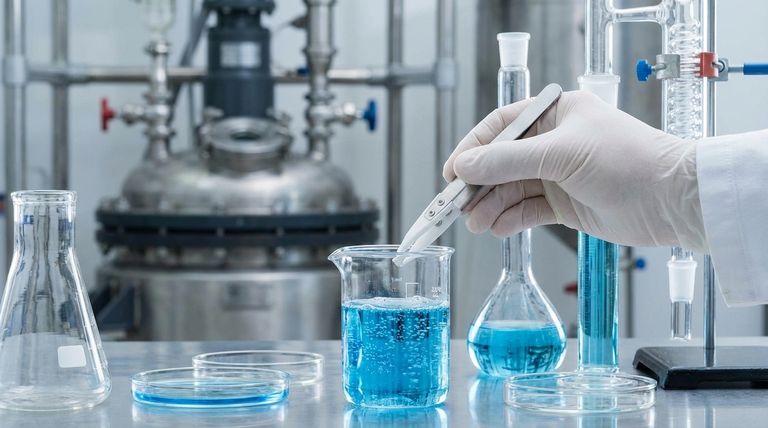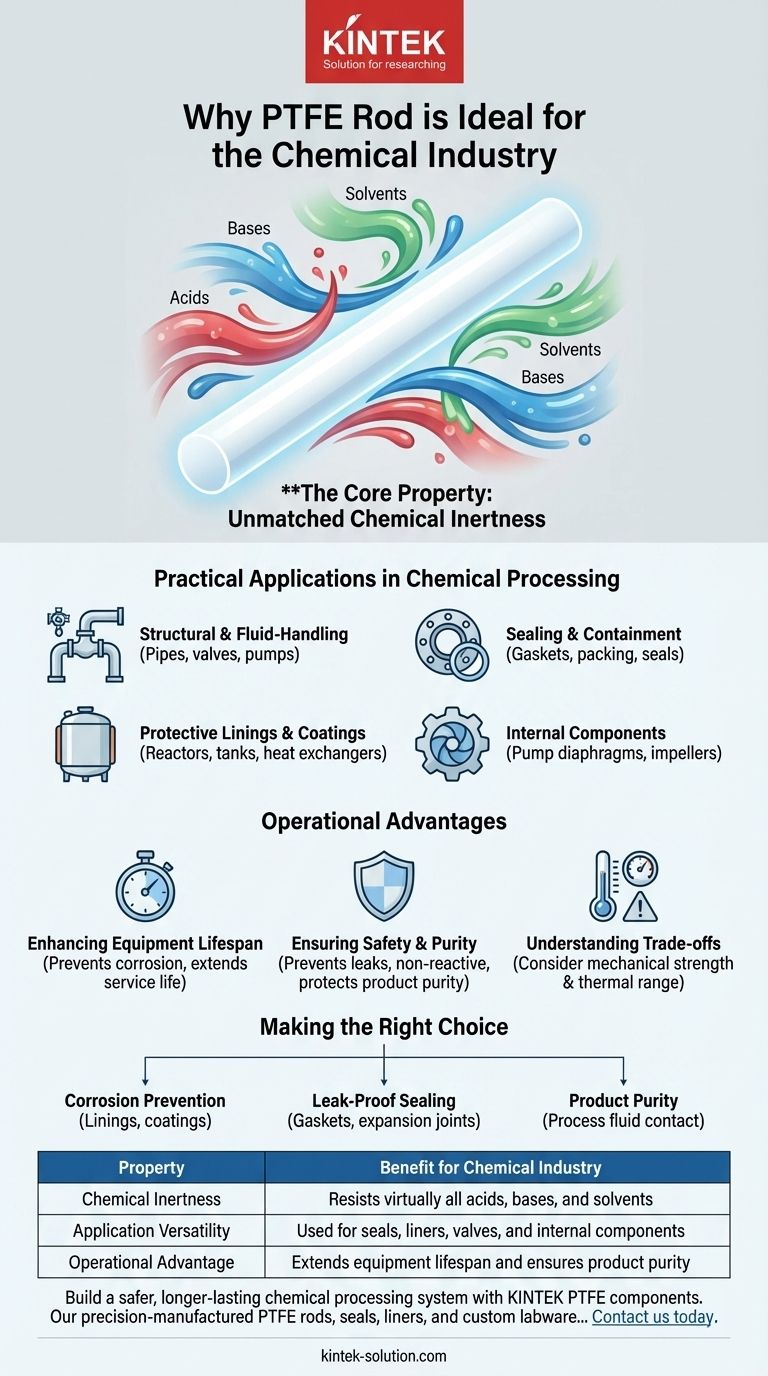The fundamental reason PTFE rod is ideal for the chemical industry is its exceptional chemical inertness. It is a non-reactive material that remains stable and intact when exposed to nearly all common and aggressive acids, bases, and solvents, preventing corrosion, contamination, and equipment failure.
The true value of PTFE in chemical applications is not just its resistance, but how this single property translates into unparalleled safety, extended equipment lifespan, and absolute product purity in the most corrosive industrial environments.

The Core Property: Unmatched Chemical Inertness
Polytetrafluoroethylene (PTFE) possesses a unique molecular structure that gives it properties few other materials can match. Its performance in the chemical industry stems directly from this foundation.
What "Non-Reactive" Means in Practice
Being non-reactive means PTFE will not corrode, dissolve, or degrade when it comes into contact with harsh chemicals. This makes it a reliable barrier that protects both the equipment and the chemical product itself.
A Broad Spectrum of Resistance
This resistance isn't limited to a few specific substances. PTFE is virtually immune to a wide array of chemicals, which is why it is specified for equipment handling diverse and often aggressive media.
Practical Applications in Chemical Processing
The inert nature of PTFE makes it a versatile material that can be fabricated into numerous critical components for chemical plants and processing facilities.
Structural and Fluid-Handling Components
PTFE rod is frequently machined into parts that are in direct, constant contact with corrosive materials. This includes pipes, valves, pumps, and pipe fittings that form the backbone of a chemical processing system.
Sealing and Containment
Because it is both chemically resistant and conformable, PTFE is a superior material for gaskets, packing, and seals. These components are critical for preventing dangerous leaks in piping systems and reaction vessels.
Protective Linings and Coatings
PTFE is used to line and coat equipment to protect the underlying structural materials, typically metal, from corrosion. This application extends the life of expensive assets like reactors, distillation towers, tanks, and heat exchangers.
Internal Components
Within larger equipment, PTFE is used for parts that must withstand chemical attack while performing a mechanical function. This includes components like pump diaphragms and impellers.
The Operational Advantages of Using PTFE
Choosing PTFE goes beyond simple material selection; it directly impacts the safety, efficiency, and longevity of chemical operations.
Enhancing Equipment Lifespan
By preventing corrosion, PTFE dramatically extends the service life of entire piping systems and major processing equipment. This reduces the need for costly replacements and downtime.
Ensuring Safety and Purity
PTFE’s reliability in preventing leaks is a primary safety benefit, especially when handling hazardous substances. Furthermore, because it does not react with or leach into the media it contains, it ensures the purity of the final chemical product.
Understanding the Trade-offs
While chemically superior, PTFE is not a universal solution for every engineering challenge. Acknowledging its limitations is key to using it effectively.
Mechanical Strength Considerations
PTFE is a relatively soft material compared to metals. In high-pressure or high-load structural applications, its lower tensile strength and potential for creep (deformation under load) must be considered during the design phase.
Thermal Operating Range
Although PTFE has a wide operating temperature range, it has defined upper and lower limits. Exceeding these can compromise its structural integrity and chemical resistance, making it essential to operate within its specified performance window.
Making the Right Choice for Your Application
Selecting PTFE is a strategic decision to mitigate risk and ensure operational reliability. Your specific goal will determine how you apply it.
- If your primary focus is corrosion prevention: Use PTFE for linings and coatings on vessels, pipes, and valves to protect the core structural metals from degradation.
- If your primary focus is leak-proof sealing: Specify PTFE for gaskets and expansion joints, especially where aggressive solvents or acids are present.
- If your primary focus is product purity: Choose PTFE for any component that directly contacts the process fluid, such as pump internals or valve seats, to eliminate the risk of contamination.
Ultimately, specifying PTFE rod and its derivatives is the definitive step toward building a safer, longer-lasting, and more reliable chemical processing system.
Summary Table:
| Property | Benefit for Chemical Industry |
|---|---|
| Chemical Inertness | Resists virtually all acids, bases, and solvents |
| Application Versatility | Used for seals, liners, valves, and internal components |
| Operational Advantage | Extends equipment lifespan and ensures product purity |
Build a safer, longer-lasting chemical processing system with KINTEK PTFE components.
Our precision-manufactured PTFE rods, seals, liners, and custom labware are engineered to provide the definitive solution for corrosion prevention, leak-proof sealing, and absolute product purity in the semiconductor, medical, laboratory, and industrial sectors. We offer custom fabrication from prototypes to high-volume orders to meet your exact specifications.
Contact us today to discuss how our PTFE solutions can enhance the reliability and safety of your operations.
Visual Guide

Related Products
- Custom PTFE Parts Manufacturer for Teflon Parts and PTFE Tweezers
- Custom PTFE Parts Manufacturer for Teflon Containers and Components
- Customizable PTFE Rods for Advanced Industrial Applications
- Custom PTFE Measuring Cylinders for Advanced Scientific and Industrial Applications
- Custom PTFE Square Trays for Industrial and Laboratory Use
People Also Ask
- What finishing techniques are effective for machined Teflon parts? Achieve Functional Performance and Dimensional Stability
- What are the unique properties of PTFE? The 3 Pillars Driving Demand for High-Performance Parts
- What design considerations are important for custom PTFE parts? Design for Performance & Reliability
- What are the unique properties of PTFE? Unlock Unmatched Performance in Demanding Applications
- What challenges arise when machining PTFE (Teflon)? Overcome Softness, Heat, and Instability



















